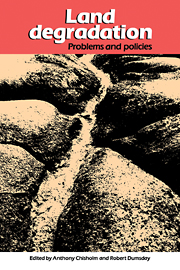Book contents
- Frontmatter
- Foreword
- Contents
- The Contributors
- Figures
- Tables
- Glossary
- Preface
- Land degradation and government
- I Physical and biological aspects of land degradation
- II Social costs
- III Legal, institutional and sociological factors
- 7 Land degradation: legal issues and institutional constraints
- 8 Land tenure: plaything of governments or an effective instrument?
- 9 Social bases of farmers' responses to land degradation
- IV Behavioural causes, economic issues and policy instruments
- V Pressure groups, public agencies and policy formulation
- VI Towards more effective policies for controlling land degradation: an overview
- A Rational approaches to environmental issues by Anthony Chisholm
- B Comments by Bruce Davidson
- C Comments by John Thomas
- D Participants at workshop on land degradation and public policy
- Bibliography
- Index
7 - Land degradation: legal issues and institutional constraints
Published online by Cambridge University Press: 05 February 2012
- Frontmatter
- Foreword
- Contents
- The Contributors
- Figures
- Tables
- Glossary
- Preface
- Land degradation and government
- I Physical and biological aspects of land degradation
- II Social costs
- III Legal, institutional and sociological factors
- 7 Land degradation: legal issues and institutional constraints
- 8 Land tenure: plaything of governments or an effective instrument?
- 9 Social bases of farmers' responses to land degradation
- IV Behavioural causes, economic issues and policy instruments
- V Pressure groups, public agencies and policy formulation
- VI Towards more effective policies for controlling land degradation: an overview
- A Rational approaches to environmental issues by Anthony Chisholm
- B Comments by Bruce Davidson
- C Comments by John Thomas
- D Participants at workshop on land degradation and public policy
- Bibliography
- Index
Summary
Introduction
Regulation and property rights—a philosophical issue
Within modern society, law and the institutions responsible for its administration and enforcement constitute a formidable combination of authority and power. The growth in administrative regulation has been based to a considerable extent on the assumption that the problems confronting urban-industrial communities could not be dealt with adequately through the traditional channels of the common law. Hence, regulation has been accepted as necessary for the public or common good, at least by most sections of the community.
Most regulation has been focused on commercial and industrial activities. However, even where health, building and planning laws have applied to individual home owners, there has been a general understanding and acceptance that such measures have a sound purpose and are of benefit to the community at large. It is interesting to perceive therefore that, in the context of land degradation, a greater degree of resistance has arisen to measures which constrain the use of land for agricultural or pastoral purposes. The hostility displayed recently in South Australia by farmers towards the introduction of vegetation clearance controls demonstrates the point vividly.
At a more general level, there appears to be a view held within some sections of the the farming community that title to land carries with it the individual right to farm the land as one pleases.
- Type
- Chapter
- Information
- Land DegradationProblems and Policies, pp. 129 - 174Publisher: Cambridge University PressPrint publication year: 1988
- 1
- Cited by

